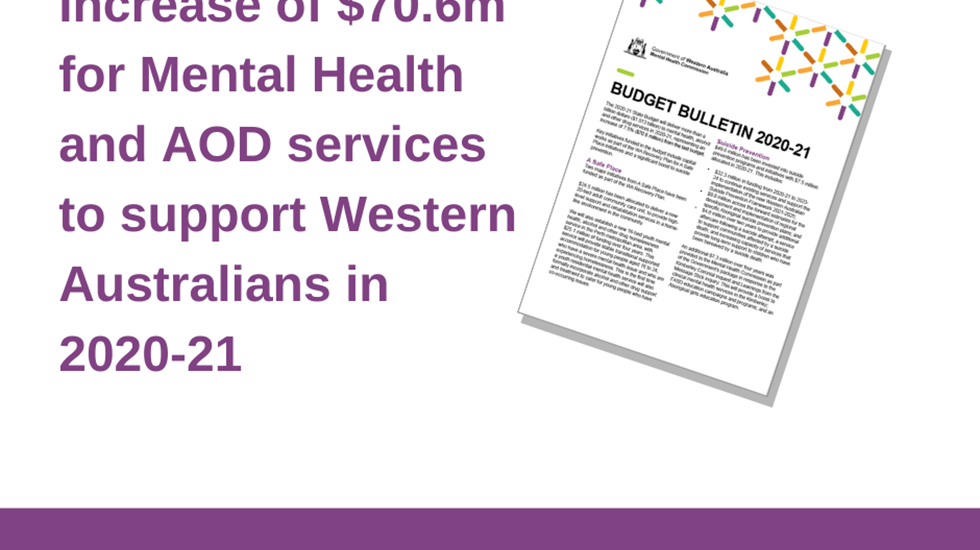A billion dollars for mental health, alcohol and other drug services
More than a billion dollars ($1.013 billion) has been allocated to mental health, alcohol and other drug services for Western Australians as part of the 2020-21 State Budget.
It is the largest ever investment in the Mental Health Portfolio, which includes alcohol and other drug prevention, treatment and supports.
Key initiatives funded in the budget include supported accommodation services, a significant boost to suicide prevention, and capital works as part of the WA Recovery Plan.

It includes the following initiatives from the A Safe Place strategy, which are also part of the Government’s WA Recovery Plan:
- $24.5 million to establish a 20-bed adult community care unit, to provide high-level support and rehabilitation services in a home-like environment in the community – a first for Western Australia.
- $25.1 million for a new 16-bed youth mental health, alcohol and other drug homelessness service in the Perth metropolitan area. This service will provide stable transitional supported accommodation for young people aged 16 to 24, who have a severe mental health issue and who are experiencing homelessness. This is the first time a youth residential mental health service will also formally incorporate alcohol and other drug support and treatment to cater for young people who have co-occurring issues.
The following additional WA Recovery Plan initiatives:
- $3.7 million for the Mobile Clinical Outreach Team service, which will continue to deliver essential mental health care to people who are homeless in Perth and Fremantle, through the East Metropolitan Health Service.
- $2.35 million in alcohol and other drug facility upgrades including the sector-leading Next Step Drug and Alcohol Service provided by the Mental Health Commission in East Perth; a boost to the Midland Intervention Centre, which will support people in alcohol or other drug crisis; and community sobering up centres in Roebourne, Carnarvon, Wyndham, Halls Creek and Fitzroy Crossing.
It includes a $49.6 million expansion to the Government’s suicide prevention programs and initiatives over four years in line with the Suicide Prevention Framework, including:
- $32.3 million in funding from 2020-21 to 2023-24 to continue critical suicide prevention services and support the implementation of the new Suicide Prevention Framework;
- $9.8 million across the forward estimates for the development and implementation of regional specific Aboriginal suicide prevention plans; and
- an additional $4.8 million over two years (2020-21 and 2021-22) to provide additional aftercare following a suicide attempt; a service to support communities affected by a suicide death; and increasing capacity of services that provide long-term support to children who have been bereaved by a suicide death.
Today’s allocation to the Mental Health Portfolio as part of the State Budget also includes $2.2 million as part of the Government’s $6 million package for immediate Covid-19 Response measures, to help support people already accessing mental health, alcohol and other drug services; help services adjust to the new environment; and maintain the infection control standards required during the pandemic.
It also includes $7.3 million as part of the State Government’s response to the Kimberley Coronial inquiry and Learnings from the Message Stick inquiry to deliver additional clinical mental health services in the Kimberley; FASD education campaigns and programs; and an Aboriginal education girls’ program.
In addition to significant increases across the community bed based services stream, an additional $39.4 million has been allocated to deliver equity in pay rates in non-government organisations across service types.
Mental Health Portfolio Budget
| 2020-21 Budget Estimate | |
|---|---|
| Prevention services | $17.266 million |
| Community Support services | $54.154 million |
| Community Treatment services | $426.966 million |
| Community Bed Based services | $87.811 million |
| Hospital Bed Based services | $426.501 million |
| TOTAL | $1012.695 million |
